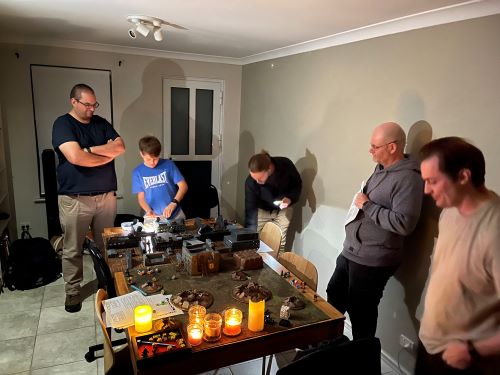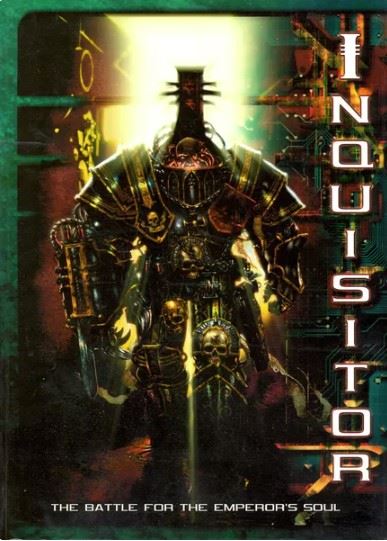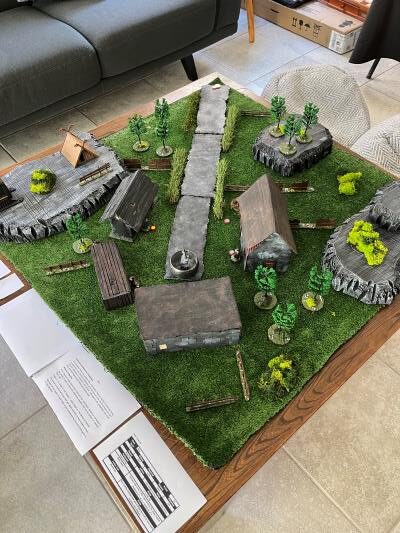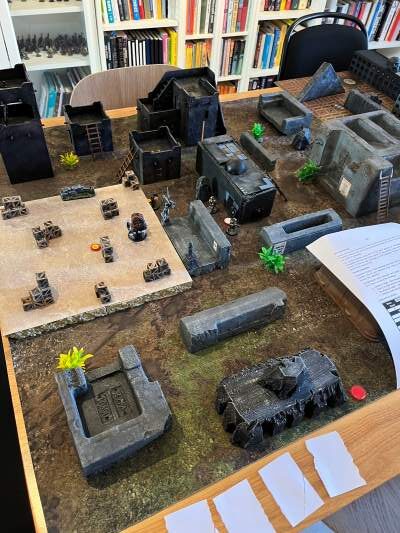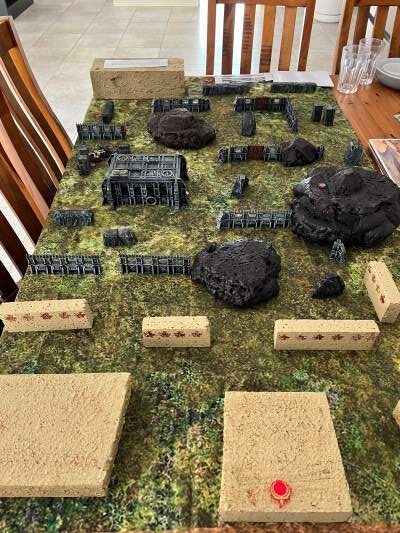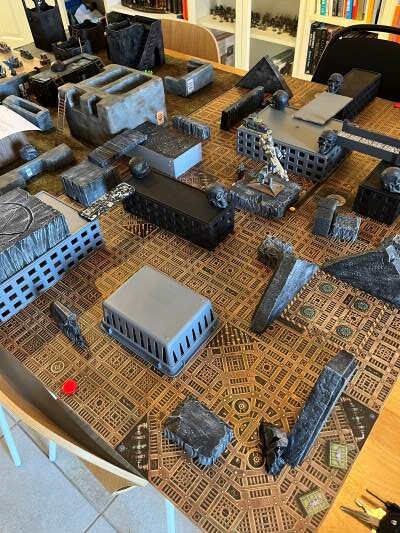Now that the dust has settled on the Echoes of Xenos event that I ran last month, I want to take some time to think about whether it worked or not. Was it a success and what lessons did I learn. Importantly did the format support or encourage emergent play. To understand the event setup and planning visit my previous post on the subject here.
So, what’s the verdict?
Did the Players have Fun?
The primary objective of any event should be the enjoyment of the players. Did they have a good time? Discussions with everyone afterwards indicated that they did. The 1 vs 1 battles and leaderboard added a sense of competition and the secret objectives added a level of uncertainty that kept players on their toes. Additionally we made sure that everyone played different opponents each round giving variety throughout. The group was very tolerant and there wasn’t much in the way of overly competitive behavior.
The only time in the event that fun may have reduced was during the last multiplayer battle, where the set up favored some players over others. The ensuing chaos saw some players have less to do than others which was an unforeseen planning error. I will talk about the last part of the event later.
Having a small break between sessions where players could discuss outcomes was a good way to create space and a bit of banter in the group. This is definitely something to keep in mind when planning for the next one.
A power cut towards the end had us all playing by candlelight which really added to the atmosphere. But of course this was a happy coincidence!
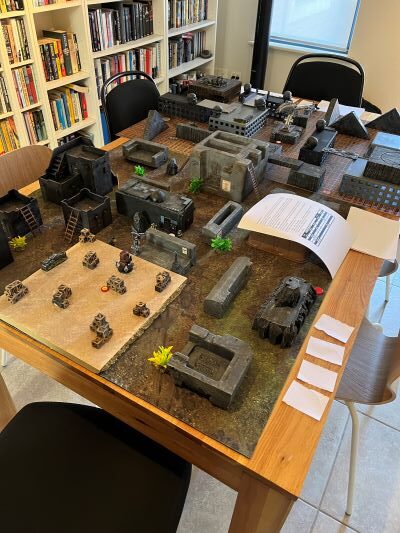
Was Emergent Play A Factor?
Unfortunately there was minimal emergent play occurring during the event. Interaction between the players was kept at the table and the storyline did not really feature very strongly. One player was attempting to make alliances and forge the narrative, however the others did not really engage in that aspect of the event.
The most emergent play occurred in the final scenario when one player (my son) went on the rampage. The other players figured he had been corrupted by chaos and teamed up to take him out. This was never a part of the original storyline, but worked really well as part of the finale.
Looking back, the faction set up and motivations of each group did not encourage as much of an emerging story as I hoped. There are a few things I would do differently next time, which I will discuss below.
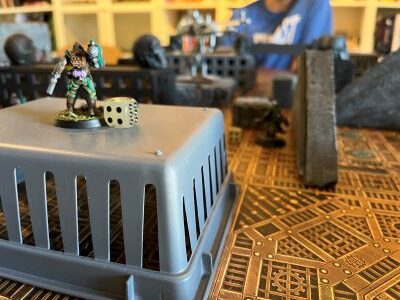
The Grande Finale – Not as Planned
I had meant to set up the finale to be a multiplayer scramble for survival. All were competing for one macguffin (held by the leading faction) whilst being hunted by Xenos (alien) abominations. This was meant to facilitate a tense rush to escape, not knowing who to trust. Unfortunately, the xenos threat was never as threatening as I’d hoped. Resulting in players hanging back. NOt the energetic frenzy I’d hoped for. In an effort to add some action my sons faction went on the rampage effectively knocking two players out early in the game resulting in a less engaging experience for them both.
With the xenos threat neutralized and most players down to one agent we called the last battle. Not the epic finale I had hope for.
So, what could be changed to make this finale more grande? Firstly, have more of an external threat that impacts the players from the get go. This would have forced factions to work together. It would have created tension as factions helped each other, not quite knowing if they were going to be betrayed. It would also have prevented the chaotic infighting that started right from the get go. This could have taken the form of a swarm of low level aliens encroaching on the players in numbers that could not be defeated alone. In turn this would drive the agents towards the greater threats of the abominations.
Secondly, all the factions deployed in the same area creating the immediate potential for infighting. Deploying factions further apart would have removed this consequence letting players position tactically before the action commenced. Additionally, this would give players a greater sense of agency that I feel the original setup perhaps removed.
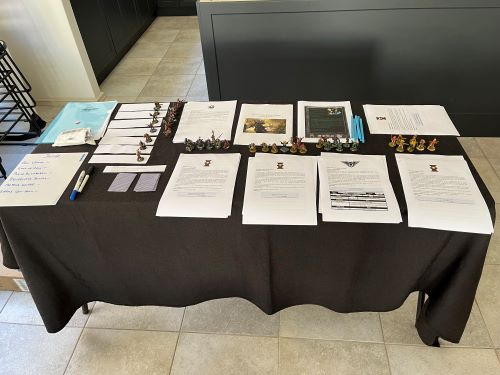
Increasing Emergent Play
Now that the game is over I think there are some clear ways that I could improve emergent play next time round.
Firstly, grouping players into factions will encourage interaction and cooperation immediately. By its very nature the increased interaction will allow emergent play to appear. Additionally, grouping players in teams or alliances creates a safer space to be creative. It’s always more fun doing this together, rather than trying to figure it out on your own.
Secondly, the scenario needs clearer factions. This is particularly true when you have players whop are not versed in the lore of your world. In this instance I love the murky world of the 40K Inquisitorial agents. But the lack of clarity makes it difficult for players to engage form a position of strength. Instead, having factions with clear goals and archetypes make them easier to engage with.
In this event all the players were gunning for the same objective making alliances difficult to form. Next time I would give every faction a different objective, but make sure they cross over. That way negotiations and alliances would become more important and emergent play more likely to appear.
Lastly, the players need a clearer reason to interact and ally with each other. A powerful external threat would neatly enhance this. In this event having a powerful alien species threatening everyone equally would force players to work together despite being enemies. Giving players the choice of allying with their enemy or facing annihilation can create some interesting negotiations and outcomes.
Final Thoughts on Echoes of Xenos
Despite not quite working as planned Echoes of Xenos was a fun event. While emergent play didn’t form as much as I’d hoped there were some very clear takeaways for the next event. I cant wait!

